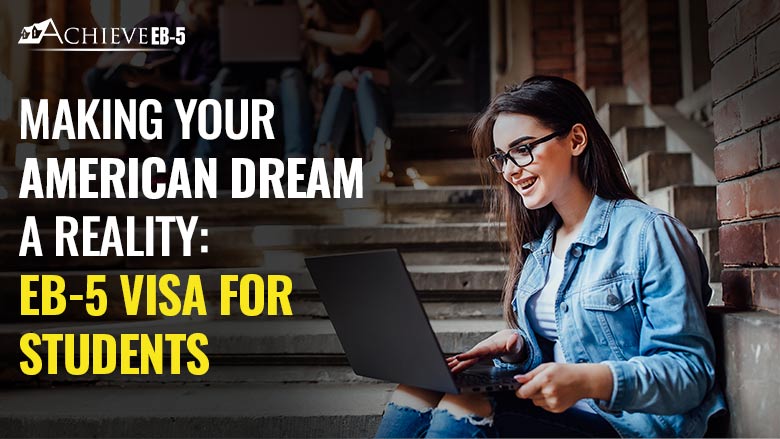Making Your American Dream a Reality: EB-5 Visa for Students

In today’s globalized world, pursuing higher education in the United States has become a dream for many international students. The opportunity to study in prestigious institutions and gain exposure to diverse cultures is indeed appealing. However, the financial aspect can be a significant hurdle for most students. This is where the EB-5 visa program comes into play, offering a pathway to make your American dream a reality.
Understanding the EB-5 Visa Program
What is the EB-5 Visa?
The EB-5 visa, also known as the Immigrant Investor Program, is a U.S. immigration program that provides a unique opportunity for foreign nationals to obtain a Green Card by investing in the U.S. economy. This program was established to stimulate the U.S. economy through job creation and capital investment. It offers a way for investors and their immediate families to become lawful permanent residents of the United States.
Investment Requirements
To qualify for the EB-5 visa, an individual must invest a minimum of $1.8 million in a new commercial enterprise in the United States. However, if the investment is made in a targeted employment area (TEA), an area with high unemployment, or a rural region, the minimum investment requirement is reduced to $900,000. The investment must also create at least ten full-time jobs for qualifying U.S. workers.
EB-5 Visa for Students
Advantages for Students
The EB-5 visa program offers several advantages for international students looking to study in the United States:
Green Card Status: Obtaining an EB-5 visa gives students Green Card status, allowing them to live and work anywhere in the United States.
No Age Limit: Unlike other U.S. immigration options, the EB-5 program has no age limit, making it accessible to students of all ages.
Freedom to Choose Any Institution: Students are not limited to specific universities or colleges, allowing them to choose the institution that best fits their educational goals.
Work Opportunities: EB-5 visa holders can work in the United States while pursuing their studies, easing the financial burden.
In-State Tuition: In many states, EB-5 visa holders are eligible for in-state tuition rates, significantly reducing the cost of education.
Eligibility Criteria
To apply for the EB-5 visa as a student, you need to meet specific eligibility criteria:
You must be at least 18 years old.
You must be able to make the required investment.
You must plan to attend a U.S. educational institution.
The Application Process
Selecting an EB-5 Project
One of the crucial steps in obtaining an EB-5 visa is selecting a suitable project to invest in. It’s essential to conduct thorough research and seek professional advice to ensure your investment meets the program’s requirements.
Filing the I-526 Petition
After choosing a project, you must file Form I-526, Immigrant Petition by Alien Investor. This petition demonstrates your intent to invest and create jobs in the United States.
Conditional Green Card
Once your I-526 petition is approved, you and your family will be granted a conditional Green Card, allowing you to live, work, and study in the United States.
Removing Conditions
Within the 90 days before your second anniversary as a conditional resident, you must file Form I-829 to remove the conditions on your Green Card. This process involves proving that your investment has resulted in job creation and that you have maintained your investment.
Making Your American Dream a Reality
The EB-5 visa program offers a unique opportunity for international students to pursue their American dream. By investing in the U.S. economy, you gain access to world-class education and the possibility of achieving permanent residency in the United States.
To take the first step towards making your American dream a reality, consider exploring EB-5 projects, consulting with immigration experts, and planning your educational journey in the United States.
Frequently Asked Questions (FAQs)
1. Can I apply for an EB-5 visa as a student without a specific university admission?
You can apply for the EB-5 visa without a confirmed university admission. However, you must plan to attend a U.S. educational institution.
2. What are the benefits of investing in a targeted employment area (TEA)?
Investing in a TEA reduces the minimum investment requirement to $900,000, making it a more affordable option for students.
3. Are there any restrictions on the type of educational institution I can attend with an EB-5 visa?
No, there are no restrictions on the type of educational institution you can attend. You can choose any university or college in the United States.
4. Can I work in the United States while studying on an EB-5 visa?
EB-5 visa holders can work in the United States while pursuing their studies, which can help cover educational expenses.
5. What happens if my I-526 petition is denied?
If your I-526 petition is denied, you will not receive a conditional Green Card, and your investment will not proceed. Ensuring your investment meets the program’s requirements before applying is essential.
